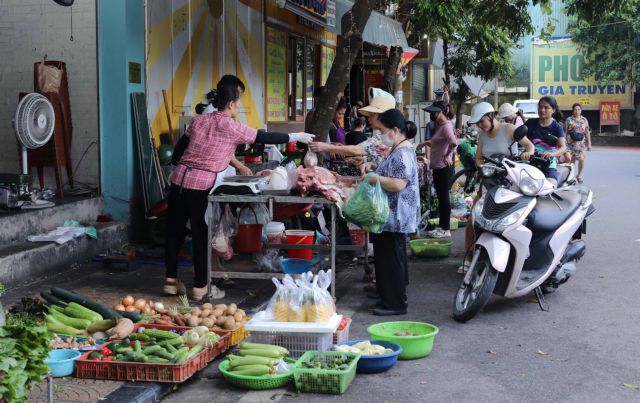 Society
Society

 |
| A makeshift wet market in Vĩnh Tuy Ward, Hà Nội. — VNA/VNS Photo |
HÀ NỘI — The Hà Nội People’s Committee has issued a directive to fully implement a city council resolution aimed at permanently removing unplanned wet markets, makeshift trading spots, and small-scale unregulated slaughterhouses within the capital.
Under the plan, the municipal Department of Industry and Trade will coordinate with relevant departments, district and commune authorities to draw up measures for dismantling temporary markets and informal street markets – which have been a familiar place for residents throughout generations to buy groceries.
Localities will be guided to review, classify and create detailed clearance schedules, as well as ensure order is maintained after removal. Authorities are also tasked with proposing support mechanisms and mobilising social resources to upgrade and expand the city’s market network. Regular inspections and strict handling of violations will be carried out, with progress reports submitted as committed.
The Hà Nội People’s Committee has assigned ward and commune administrations to take inventory, make clearance plans and act within their authority, with a firm deadline of completion in 2025. Public awareness campaigns will be launched to discourage shopping at informal markets and to encourage shifts in consumer habits. Local leaders will be held personally accountable if targets are not met.
For the management of livestock and poultry slaughtering, the Department of Agriculture and Environment will inspect all small-scale slaughtering facilities, identifying those operating without licences or failing to meet food safety standards. More than 700 slaughtering sites in residential areas will be targeted for closure before September 2025. The department will adjust the zoning of centralised slaughterhouses, propose policies to encourage investment in modern facilities, and support the relocation of small-scale operations, with all work to be completed before November 2025.
Ward and commune authorities will oversee slaughtering activities in their areas, penalising illegal operations and promoting the relocation of businesses into centralised facilities. Joint inspection teams will crack down on meat products without clear origin or veterinary checks.
In a recent city meeting on executing this plan, Deputy Chairman of the Hà Nội People’s Committee Nguyễn Mạnh Quyền reaffirmed the city’s determination to completely remove informal markets within the year 2025.
Despite this commitment, the prevalence of informal markets – deeply ingrained in the daily life of many Hanoians – poses significant challenges. Densely populated areas remain hotspots for such markets, including Mai Dịch Street (Nghĩa Đô Ward), Nhân Hòa Street (Thanh Xuân Ward), the Thăng Long Boulevard service road, and Chính Kinh Market (Khương Thượng Ward).
In Dương Nội Ward, authorities have conducted frequent clearance operations with the involvement of multiple agencies and mass organisations. However, these efforts often prove temporary, with street vendors returning shortly after enforcement actions. Officials acknowledge that while road clearance and pedestrian safety are important, the livelihoods of small traders must also be considered.
A representative of the Hà Nội Department of Industry and Trade emphasised that clearing unplanned markets is not just about regulating prices and quality, but also about improving the city’s image and eliminating the makeshift nature of street trading. The department plans to integrate market clearance into broader urban management efforts, linking it with city-wide steering committees to ensure coordination and prevent recurrences.
Architect Đào Ngọc Nghiêm, Vice Chairman of the Việt Nam Urban Planning and Development Association, noted that the shortage of local 'official' markets in many wards and communes drives the growth of informal markets, which in turn affects traffic safety, hygiene, and the urban environment. He recommended that the city adopt inclusive and well-funded policies to build and upgrade markets that serve all income levels, particularly middle- and low-income residents, thereby removing the need for informal street markets altogether. — VNS




